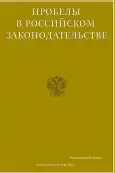To the Question of Responsibility for Public Actions Aimed to Discredit the Use of the Armed Forces of the Russian Federation for the Purposes of Protecting the Interests of the Russian Federation and its Citizens, Maintaining International Peace and Security
- Authors: Shkhagapsoev Z.L.1, Akkaeva H.A.1
-
Affiliations:
- North Caucasus Institute for Advanced Studies (branch) of the Krasnodar University of the Ministry of Internal Affairs of Russia
- Issue: Vol 15, No 3 (2022)
- Pages: 239-243
- Section: Articles
- URL: https://journals.eco-vector.com/2072-3164/article/view/531697
- ID: 531697
Cite item
Abstract
Public actions have a significant impact on the formation of public perception of many state-significant processes, in connection with which Russian legislation regulates in great detail the features of organizing and holding various public events. However, members of the public quite often ignore the relevant requirements, and moreover, very subjectively assessing various political situations, they actively engage in illegal public activities. In the context of the aggravated geopolitical conflict between Russia and Ukraine and the ongoing special military operation in the Donbass, the spread of unlawful behavior aimed at discrediting the Armed Forces of the Russian Federation has become an actual trend in Russian society. The purpose of writing a research paper is to analyze the responsibility provided for by the current criminal legislation for public actions aimed at discrediting the use of the Armed Forces of the Russian Federation in order to protect the interests of the Russian state and its citizens, as well as to maintain international peace and security. The author comes to the conclusion that the disposition of Art. 280.3 of the Criminal Code of the Russian Federation currently provides for a very broad content, but it seems fair that the institution of responsibility for the analyzed unlawful behavior is oriented towards administrative and legal mechanisms, and in the event of their inefficiency or a significant amount of negative consequences for individuals and society, the criminal law norm is used. The timeliness of the addition of the Criminal Code of the Russian Federation to Art. 280.3, which needs further detailed interpretation by law enforcement and judicial authorities.
Full Text
About the authors
Zaurbi Lelovich Shkhagapsoev
North Caucasus Institute for Advanced Studies (branch) of the Krasnodar University of the Ministry of Internal Affairs of Russia
Email: nfkru@mvd.ru
Dr.Sci.(Law), Professor, Police Colonel, Head of the North Caucasus Institute for Advanced Studies (branch) of Krasnodar University of the Ministry of Internal Affairs of Russia Nalchik, Russia
Halimat Alievna Akkaeva
North Caucasus Institute for Advanced Studies (branch) of the Krasnodar University of the Ministry of Internal Affairs of Russia
Email: lel4993@mail.ru
Cand.Sci.(Law), Police Colonel, Head of special technical disciplines Department Nalchik, Russia
References
- Two residents of Irkutsk fined under the article on discrediting the Armed Forces of the Russian Federation // Interfax. URL: https://www.interfax.ru/russia/829882 (date of access: 03/20/2022).
- Kuznetsov R.D. To the question of the concept of public calls for the implementation of extremist activity: problems of qualification // Questions of Russian justice. 2020. No. 6. S. 408-414.
- Oganesyan S.S., Khaadi T.A. Problems of legal perception of the phenomena of extremism and terrorism in different mental civilizations: general theoretical and historical-philosophical aspects // Penitentiary science. 2021. V. 15. No. 2 (54). pp. 237-246.
- Kharlamova A.A., Makeeva I.S. Crimes of an extremist orientation: general characteristics and some features // Russian investigator. 2022. No. 1. S. 55-59.
- What is now forbidden to write about the Armed Forces of the Russian Federation? // Center for the Protection of Media Rights. URL: https://mmdc.ru/services/common/chto-teper-nelzya-pisat-o-vooruzhennyh-silah-rf/ (date of access: 03/20/2022).
Supplementary files








